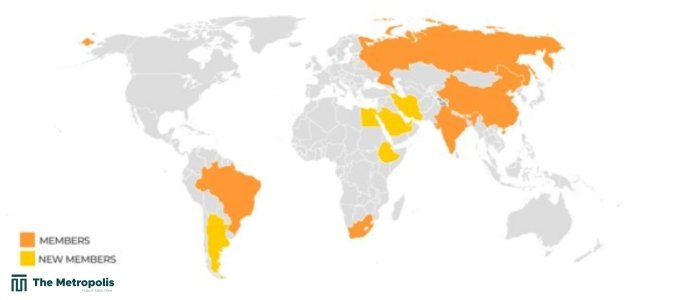Source- Al- Jazeera
Metropolis Desk-
On the third day of a meeting of the group that sees itself as a counterweight to Western powers, South African President Cyril Ramaphosa announced that Saudi Arabia and Iran are among six countries asked to join BRICS as new members next year.
The three-day annual summit held this week in Johannesburg saw agreement on “the guiding principles, standards, criteria, and procedures of the BRICS expansion process,” according to Ramaphosa. The group, which consists of the five major emerging economies of China, Brazil, South Africa, Russia, and India, decides by consensus.
Argentina, Egypt, Ethiopia, Iran, Saudi Arabia, and the United Arab Emirates have been invited to join as full members from January 1 next year.
“This membership expansion is historic,” said Chinese President Xi Jinping.
“The expansion is also a new starting point for BRICS cooperation. It will bring new vigor to the BRICS cooperation mechanism and further strengthen the force for world peace and development.”
A senior adviser to Iran’s president on Thursday welcomed the country’s admission to the grouping.
“Permanent membership in the group of global emerging economies is considered a historic development and a strategic success for the foreign policy of the Islamic republic,” said Mohammad Jamshidi on X, formerly known as Twitter.
Abiy Ahmed, the prime minister of Ethiopia, praised what he called “a great moment” for his nation.
Abiy posted on Twitter, “Ethiopia stands ready to cooperate with all for an inclusive and prosperous global order.”
“We look forward to developing this cooperation to create new developmental and economic opportunities and elevate our relationship to the aspired level,” Prince Faisal bin Farhan, the foreign minister of Saudi Arabia, said at the conference on Thursday.
Later, he said in an interview with Saudi television network Al Arabiya that the kingdom welcomed the invitation and will examine the specifics before making an “appropriate decision” about the suggested joining date.
According to Ramaphosa, the core group of five BRICS nations has been debating the topic of growth for more than a year. The new members were invited this week as a result of a summit agreement.
The group’s growth is a component of its strategy to consolidate power and transform global governance into a “multipolar” system that prioritizes the voices of the Global South.
Saudi Arabia, the United Arab Emirates, Iran, and Egypt are the first MENA nations to be represented in the organization, while Brazil, another member, pushed for the addition of Argentina.
According to commentators, Russia and China aggressively pushed for expansion because they were being rebuffed by the West through sanctions.
Other BRICS countries were initially more ambivalent, but leaders came out in vocal support of the plan this week.
The grouping of emerging economies has been in formal existence for 15 years. Some experts told Al Jazeera that it has not achieved much and the diffuse nature of their political and social interests means BRICS leaders do not always agree on issues. Some say that has prevented them from becoming a more powerful or effective entity.
“What [BRICS is] trying to achieve in a way is being opened up for more discussion,” Danny Bradlow, a professor with the Centre for the Advancement of Scholarship at the University of Pretoria, told Al Jazeera ahead of the summit. “As long as it was just the five countries, they were talking about the reform of global economic governance or global governance generally … But they haven’t done very much about that.
“Getting agreements among the five has not been all that easy,” he claimed. “It gets even more complicated if they increase membership. However, who they add as new members also matters.
The BRICS club, which already included countries representing 40% of the world’s population and more than 40 countries that had expressed interest in joining, received formal applications for membership from 23 of those nations.
The meeting in South Africa, which ends on Thursday, is being attended by some 50 additional heads of state and other influential figures.



